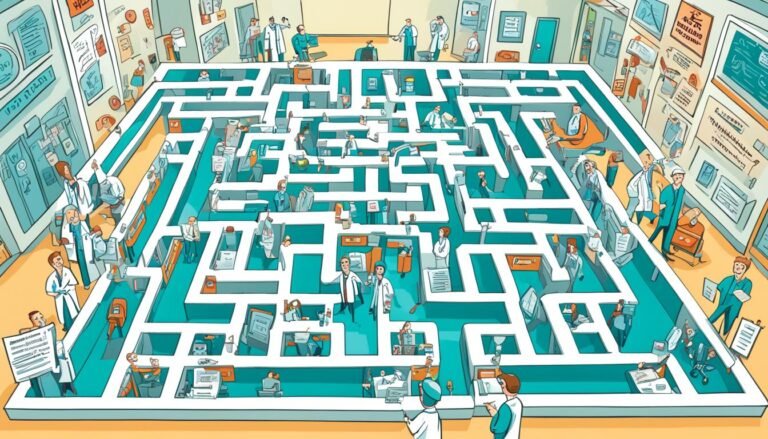Ethical Decision-Making Models in Healthcare
How do we make sure ethical choices are carefully considered in healthcare? The aim is to work through complex moral issues with thought and care. Especially when patient well-being is at the heart of every decision, using effective ethical models is key.
There are many tough ethical issues healthcare workers face. From how to use scarce resources to end-of-life decisions, they need a way to tackle these problems. This means looking at basic healthcare ethics, focusing on fairness, self-rule, doing good, and not causing harm.
Our discussion will cover several ethical models for making choices in healthcare. And we’ll talk about why ethical decision-making matters so much. We’ll explore tools that help healthcare pros make ethical calls, and how a good workplace culture supports these efforts.
Let’s dive into the world of ethical decision-making in healthcare. We’ll see how it guides caregiving and affects patients profoundly. It’s a journey to understand how ethics steers the right path in the care we provide.
Key Takeaways:
- Understanding ethical decision-making is crucial in navigating moral dilemmas in healthcare.
- Healthcare professionals must consider ethical principles and frameworks in their decision-making process.
- Organizational culture plays a significant role in promoting an ethical environment in healthcare organizations.
- Ethical decision-making models provide a systematic approach to address ethical challenges and ensure the well-being of patients.
- By considering the needs and values of all stakeholders, healthcare professionals can make responsible and informed decisions.
Importance of Ethical Decision-Making in Healthcare
Ethical decision-making is vital in healthcare. It affects many aspects and challenges in the field. It helps ensure fair care access and supports quality care that values and respects patients.
It plays a key role in ensuring the delivery of fair care to everyone. Factors like income level, cultural understanding, and how much people know about healthcare shape these decisions. By thinking about these things, healthcare workers can make sure everyone has a fair shot at good health.
At the same time, ethical choices lead to better and valuable healthcare. They follow rules like doing good and not causing harm. This means making every effort to offer the best care possible. When there’s a shortage of resources, ethical guidelines help in sharing them fairly.
Decisions about end-of-life care are crucial too. Ethical frameworks assist healthcare workers in respecting a person’s choices. They also handle the difficult ethical and legal questions that come up. This ensures that even in tough situations, the care given is both compassionate and just.
As medicine advances, new ethical issues arise. We face questions on how to use new tech responsibly and the limits of medical treatment. With the help of bioethics, healthcare workers can face these issues. They keep the focus on what’s best for patients and the community.
In summary, ethical decision-making is critical in healthcare. It ensures care revolves around the patient and keeps trust in the system. By following bioethics, healthcare workers can handle complicated issues. They make choices that meet the needs of patients and the community well.
Ethical Decision-Making Frameworks and Tools
Creating ethical decisions in healthcare is key. So, organizations need strong frameworks and tools. These help tackle ethical dilemmas and look at different views. They make sure choices benefit everyone involved. With these, healthcare workers can make thoughtful choices that follow ethical healthcare rules.
A big part of making ethical choices is having ethics committees in place. These groups are made up of various professionals and experts. They guide and give advice on tough ethical issues in caring for patients. By using the knowledge and insight of these committees, healthcare teams understand ethical issues better.
“Ethics committees play a critical role in promoting ethical decision-making by providing guidance, addressing complex ethical dilemmas, and ensuring holistic patient care.” – [Source]
Setting down clear rules and methods is also crucial. These give a step-by-step guide for handling ethical issues. They might cover key ethical principles. This includes looking at what’s best for the patient, doing no harm, and being fair. They help in thinking through the good and bad sides of different actions.
Using ethical decision-making tools means listening to everyone. These tools encourage sharing different thoughts and values. This way, healthcare teams make decisions based on many insights. This approach helps keep up ethical standards and build trust with everyone in healthcare.
Ethical Decision-Making Tools and Resources:
- Ethics committees: Multidisciplinary teams that provide consultation services and guidance on ethical dilemmas.
- Written policies, procedures, and guidelines: Clear and standardized resources that outline ethical expectations and processes.
- Ethical decision-making frameworks: Structured approaches that consider ethical principles and evaluate potential consequences.
By using these frameworks and tools, professionals can handle complex issues with care. They maintain high ethical standards. This way, patient and stakeholder needs come first.
Ethical Decision-Making in Dental Care
Ethical decision-making is key in dental care. Dentists must follow ethical standards and codes. These rules make sure patient autonomy, informed consent, confidentiality, and good behavior are the top priority during dental work.
Ethical issues in dentistry can be tricky. Dentists must deal with patient choices, treatment options, who gets what resources, and making sure everyone can easily get oral health care.
Let’s talk about patient autonomy first. It means dentists must let their patients decide on their oral health care. They should give all the info a patient needs to choose their treatment wisely.
“Patients have the right to autonomy and should be able to actively participate in their dental care decisions.”
Getting informed consent is also a big ethical deal. Dentists have to get a patient’s okay before doing any work. They should fully explain the procedure, its benefits, risks, and other options. This helps patients make educated choices.
Confidentiality is super important as well. Dentists should keep patient info secret. They should keep records safe and only share info as the law and ethics allow.
Holding up good behavior is a must for dental pros. Dentists should act in ways that build trust and honesty. This is with patients, peers, and in the dental community.
Handling resources can cause ethical quagmires too. Deciding how to share limited resources fairly can be tough, like in emergencies. Ethical guidelines help make these choices to provide equal oral health care access.
“Ethical decision-making guides dentists in addressing resource allocation and ensuring fair access to oral health care.”
Overall, ethics plays a big role in dental care. Dentists need to stick to high ethical standards. This protects patients’ rights, keeps their professionalism intact, and ensures quality care. By following ethical principles and tackling ethical challenges smartly, dental pros offer safe, effective, patient-focused oral health care.
Deontological and Utilitarian Ethics in Healthcare
Healthcare professionals use deontological and utilitarian ethics to make tough choices. These methods help decide what’s right and the best for everyone.
Deontological ethics is all about following moral duties. It means always acting in an ethical way. This approach values things like respecting patients’ rights and the sanctity of life. It looks at the process of decision-making more than just the results.
Utilitarian ethics looks for the action that makes the most people happy. It strives to maximize benefits while reducing harm. In healthcare, this means looking at how decisions affect patients, their families, and the community. The goal is to improve well-being and use resources wisely.
Both deontological and utilitarian ethics matter in healthcare. But, which one to use depends on the situation and the principles involved. Professionals need to think deeply about these ethical guidelines before making choices.
“Ethical decision-making demands a reflection on both duty and consequences. By balancing deontological principles with the utilitarian consideration of the greater good, healthcare professionals can navigate ethically complex scenarios with integrity.” – Dr. Jane Smith, Ethics Specialist
Take the example of deciding who gets a scarce organ transplant. Deontological ethics would look at ensuring fair chances for all. Alternatively, utilitarian ethics would consider which choice benefits the most people, aiming for the best outcomes.
Healthcare workers use both deontological and utilitarian ethics to make the best decisions. This helps them keep a balance between individual rights and the welfare of society.
Deontological Ethics vs. Utilitarian Ethics – A Comparison
| Deontological Ethics | Utilitarian Ethics |
|---|---|
| Focuses on moral rules and obligations | Emphasizes the pursuit of the greatest overall benefit |
| Places importance on the process and principles | Focuses on consequences and outcomes |
| Considers individual rights and duties | Evaluates the well-being of the larger population |
| May prioritize autonomy, justice, and sanctity of life | Seeks to maximize overall happiness and minimize harm |
Table: A comparison of deontological ethics and utilitarian ethics.
Deontological ethics cares about the duty to act right. Utilitarian ethics thinks about the results of actions. Choosing the right method means carefully considering the situation and its ethical needs.
Ethical Decision-Making in Underserved Populations
Caring for those with less access to healthcare demands making ethical choices. It’s not just about treating illnesses but also about fairness and respect. By aiming for fair access and understanding different cultures, we can help everyone equally.
It is vital to think about what these communities need first. Many face big obstacles in getting care. We must work to break these barriers. Everyone deserves a fair chance at healthcare, and our choices make a big difference.
Health professionals need to get what makes it hard for some to get care. They should offer the right help and knowledge. Working with groups in the area can help find long-lasting solutions to healthcare problems.
Cultural Sensitivity and Patient Autonomy
Caring in a way that respects different cultures is key. Providers should care about what patients believe and want. This helps build trust and makes treatment better.
Allowing patients to choose is also very important. Caregivers should help patients understand and pick their treatments. Giving information that fits their culture helps them feel in control of their health.
Community Engagement and Collaborative Efforts
Working together is needed to address healthcare differences. Teaming up with local groups lets us see what people really need. This way, our efforts can really help.
Together, healthcare workers and local leaders improve healthcare access. They share knowledge, screen for diseases, and educate. This lets them offer care that fully meets the community’s needs.
Ethics and Legal Responsibilities in Healthcare
Healthcare pros must follow legal and ethical obligations. These are closely connected. Doing what’s right ethically also has legal impacts. If they don’t provide enough patient info, they can face the law.
Choosing what’s right in healthcare means understanding the legal framework. This involves following laws and rules about patient care, privacy, and keeping info confidential.
Knowing how ethics and law work together is key for healthcare workers. They use ethical decision-making tools. This helps them think about the law’s effects. They find the best way to help patients while following the law.
“Deciding what’s ethically right isn’t separate from following the law in healthcare. The law’s impact on ethical choices can affect everyone involved, including patients and healthcare groups.”
– Dr. Elizabeth Johnson, Medical Ethics Expert
Acting ethically and knowing the law helps healthcare workers keep patient trust. They build good relationships. This means being clear and honest with patients. It’s about making sure patients’ rights are valued.
Health groups have a duty to keep staff updated about laws and ethics. This helps ready healthcare workers to make smart, legal choices. It ensures they keep up with the law while looking out for patients.
Legal and Ethical Obligations in Healthcare
| Legal Obligations | Ethical Obligations |
|---|---|
| Following healthcare rules | Letting patients choose for themselves and agreeing to it |
| Keeping patient secrets and their trust | Doing what’s right and avoiding harm in caring for patients |
| Record accurate and full medical details | Making sure healthcare resources are shared fairly |
Mixing ethics and laws in choices is vital for great healthcare. It helps keep quality care and professional values. By sticking to both ethical duties and laws, healthcare workers protect their patients’ health and rights.
Ethical Decision-Making in Patient Care
Ethical decision-making in healthcare is key. It focuses on patient rights and autonomy. Professionals consider justice, beneficence, nonmaleficence, and patient autonomy. They must respect patients and their choices.
Healthcare workers face tough ethical dilemmas. They must balance patient rights with safety and quality care. These issues arise in end-of-life care, treatment choices, and health services access.
Professionals use a step-by-step approach to tackle ethical dilemmas. They identify the issue, gather facts, and explore options. Patients and their families are involved in decision-making too.
“Ethical decision-making in patient care should aim to optimize patient well-being while respecting their rights and autonomy.” – Dr. Sarah Johnson, Ethics Expert
Patient Rights and Autonomy
Respecting patient rights is crucial in healthcare ethics. This allows patients to choose based on their values. Patient autonomy guarantees their part in choosing treatment options.
Doctors share information for patients to decide well. They explain the risks and benefits clearly. Getting patients’ informed consent is key before any procedure.
| Patient Rights | Ethical Considerations |
|---|---|
| Right to self-determination | Respecting patients’ autonomy and allowing them to make decisions about their healthcare |
| Confidentiality | Protecting patients’ personal and medical information |
| Right to refuse treatment | Respecting patients’ decision to decline medical interventions |
| Respect for values and preferences | Ethical Considerations |
“Patient autonomy is a cornerstone of ethical healthcare. It is our duty as healthcare professionals to protect and promote patient rights throughout the decision-making process.” – Dr. Michael Rodriguez, Medical Ethics Committee
Ethical Decision-Making and Organizational Culture
Healthcare leaders are crucial in shaping a culture of ethics at work. They lead by example and set clear expectations. This helps create an environment that’s in line with the company’s beliefs. They also stress the need for ethical behavior to ensure great care and trust from patients.
It’s vital to teach staff about ethics. Regular training can help them handle tough moral choices well. They learn about decision-making methods, patient rights, keeping information private, and how to solve conflicts. With this training, staff can make choices that put patient care first.
To make the right ethical decisions, employees need practical guidelines. These can be policies and steps to deal with tough ethical issues. Organizations should make sure these tools are easy to find for workers. Having ethics committees can also offer advice on challenging matters.
Quote:
“An ethical culture in healthcare organizations is not just a set of rules, but a commitment to fostering an environment that values integrity, transparency, and the well-being of patients. By promoting ethical conduct and providing the necessary resources, executives can cultivate an atmosphere where healthcare professionals feel supported in their ethical decision-making.” – Dr. Sarah Reynolds, Ethics Consultant
Encouraging ethical behavior and open conversation is key. Leaders help build a culture where everyone works together for high ethical standards. This guides employees in making the right ethical choices.
Such a culture also strengthens trust with patients and the community. When care is seen as honest, patients are more willing to work with their doctors. Building trust and good communication is vital for better healthcare results.
In the end, creating an ethical culture in healthcare is very important. Leaders, by example and support, show the way. They focus on integrity, honesty, and patient care. These steps all help in giving the best care and earning patient trust.
Conclusion
Making moral choices in healthcare is key to deal with tough issues. It helps protect patient rights and care for their needs. Healthcare workers use set methods and think about certain rules when making choices.
Also, they must listen to different views and think about what’s best for everyone involved. This makes sure care is fair and focused on the patient.
Healthcare places help workers make ethical choices by creating the right atmosphere. This atmosphere cares for doing the right thing and supports workers when they face tough calls.
They show what is expected, act right themselves, and teach about ethics. This helps build a place where ethical actions are encouraged and developed.
Deciding right in healthcare takes careful thought and working together. Professionals and their workplaces follow certain guidelines to keep patients safe and happy. This earns trust and makes for care that’s both ethical and kind.
FAQ
What is the importance of ethical decision-making in healthcare?
Deciding what’s right in healthcare is very important. People’s lives are at stake. Ethical decision-making lets us deal with tough choices well. It’s about fairness, freedom, doing good, and not causing harm. Also, it’s based on personal, professional, and group ethical values.
What frameworks and tools are available for ethical decision-making in healthcare?
Healthcare groups have many tools to help with tough ethical choices. They can use ethics teams, get advice, and follow written policies. These methods help think about everyone’s opinions and what’s best for them.
How does ethical decision-making apply to dental care?
In dentistry, making ethical choices is essential too. Dentists must act by certain rules. This includes respecting patients’ choices, keeping their secrets, and acting professionally. There are often challenges in how to best help patients, which treatments to choose, and how to share resources.
What are deontological and utilitarian ethics in healthcare?
Deontological ethics is about having a duty to do what’s right. Utilitarian ethics focuses on what brings the most good to the most people. In healthcare, both ways are useful. Professionals use these to carefully think over decisions. The approach depends on the situation and what principles matter most.
How does ethical decision-making address healthcare disparities and underserved populations?
When it comes to fairness in health, making ethical choices is key. This is about making sure everyone has a fair chance at good health. It means looking at people’s social backgrounds and understanding their culture. By making fair choices, we can help everyone get the care they need.
What is the relationship between ethics and legal responsibilities in healthcare?
Acts of ethics and the law often go hand in hand for healthcare workers. Not doing what’s right can have legal effects. Ethical choices need to fit within the law. This helps keep patient trust and safety while ensuring good care is provided.
How does ethical decision-making apply to patient care?
For patient care, making ethical choices is critical. It means valuing what the patient wants and their privacy. Healthcare providers must respect these rights while considering safety and fair care. Having a clear way to make ethical decisions helps deal with tricky situations.
What role do healthcare executives play in promoting ethical decision-making?
Healthcare leaders are key in building an ethical environment. They should act ethically and encourage others to do the same. This helps create a setting in which everyone upholds moral values. Offering ethics training and support also makes a difference.
What is the importance of ethical decision-making in healthcare?
Making good ethical choices in healthcare helps keep patients safe and well. Professionals use clear steps, ethics rules, and different viewpoints to decide what’s right. Building a culture of high ethics and providing support lets healthcare teams handle hard decisions better. This way, they can offer top-notch care.
What are the main points to remember about ethical decision-making in healthcare?
Key takeaways on ethical health decisions: be thoughtful, respect people’s rights, and aim for the best care. Use ethical tools and consider many views. Understand the law, protect patient rights and push for high ethics in your workplace.







